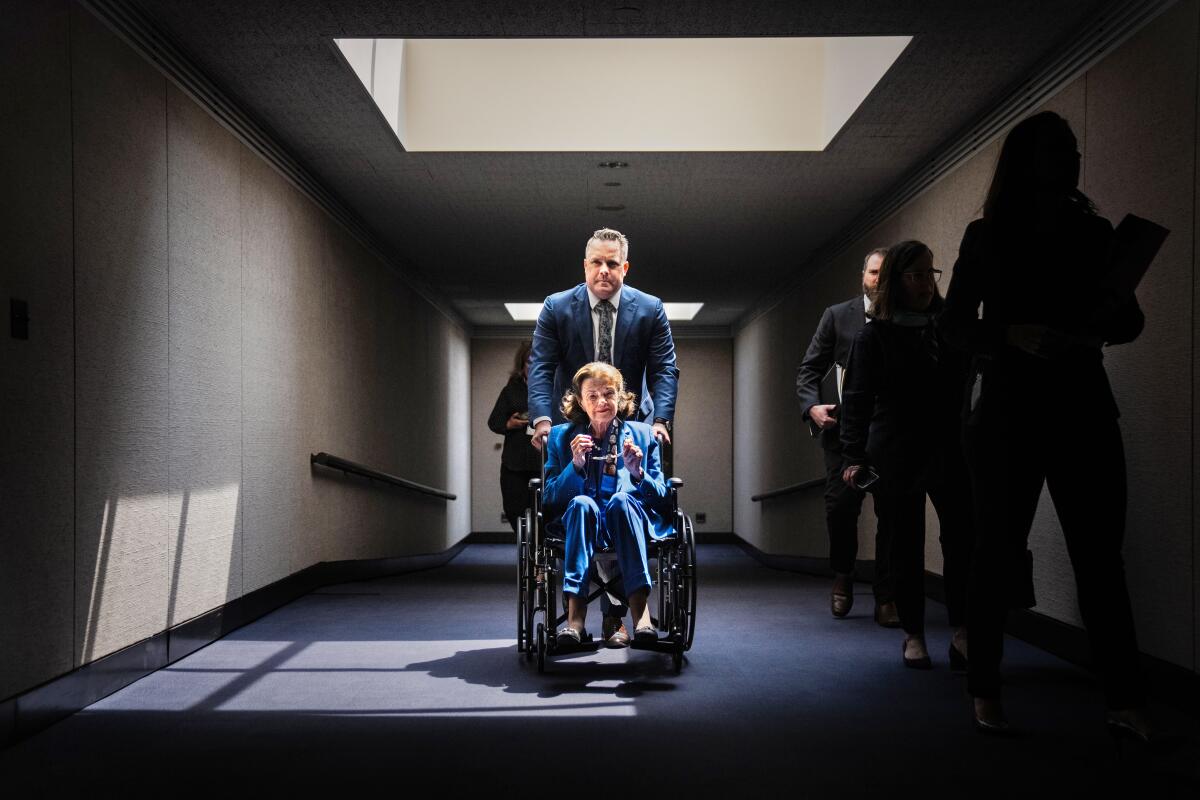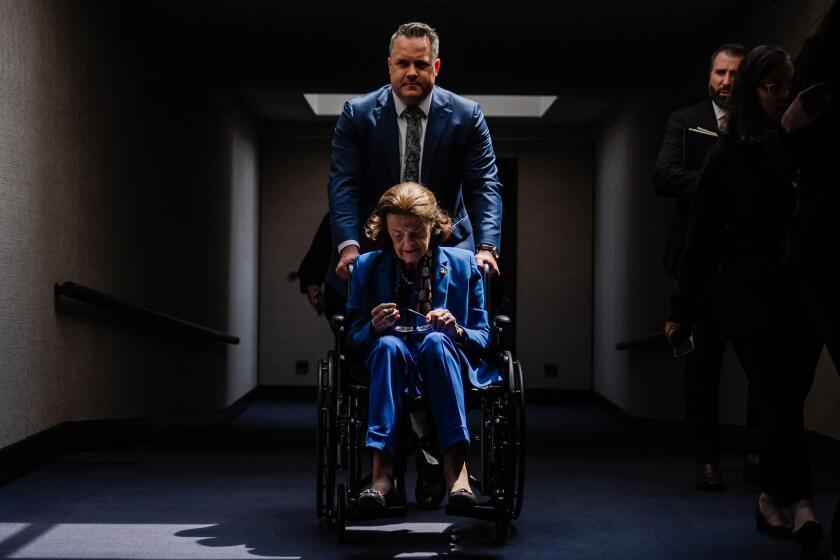Feinstein responds to questions about her absence from Washington

- Share via
WASHINGTON — With the help of a staff member, Sen. Dianne Feinstein rose from her wheelchair, gripped his arm and walked onto the floor and cast her second vote of the week. She voted against a plan to nullify some criminal justice reforms the District of Columbia had recently passed, and then walked off the floor.
Back in her wheelchair, she exited an elevator and was met by a reporter — who asked about her health.
“Aren’t you an eager one,” she said.
Feinstein, 89, returned last week after months away from the Senate as she recovered from the shingles virus, a serious health concern that followed years of questions about her cognitive abilities. Her absence from Washington didn’t derail the confirmation of President Biden’s judicial nominations or the work of federal government, but it did cause angst among Democrats who worried that the slim margins of their majority could make their work difficult or impossible.
In a brief exchange with reporters after voting, she mentioned a problem with her leg but on the balance of things said she was feeling better. Then another reporter asked about the well wishes she’d received from her Senate colleagues since her return last week.
“What have I heard about what?” she asked.
“About your return,” the reporter replied.
“I haven’t been gone,” she said. “You should ... I haven’t been gone. I’ve been working.”
“You’ve been working from home is what you’re saying?”
“No, I’ve been here. I’ve been voting. Please, either know or don’t know.”
Sen. Dianne Feinstein’s first day back at the Judiciary Committee after an extended absence for shingles — a forum where she spent decades sparring with nominees — was short.
She then breezed by in her wheelchair and didn’t respond to other questions. The interview wasn’t more than a minute and it was one of the few times she’s spoken to reporters since returning to the Capitol. The senator has revealed little about her health or her workload — aside from statements saying she was being briefed about Senate business while she recuperated at home in San Francisco and that, when she returned to Washington, her doctors told her to work a light schedule.
Her health and mental acuity have been questioned by the press and her colleagues in recent years. Feinstein has long been known as not only powerful but hands-on — demanding, for example, to edit media advisories before they were sent out. But several stories, including one last year in the San Francisco Chronicle, described the deterioration of her memory. Feinstein at the time dismissed the stories, saying she was still fit to serve.
Last Thursday at the Senate Judiciary hearing, she helped push through three nominations that had lacked bipartisan support and thus had been stuck in limbo because of her absence. With her return to the Senate, Democrats now have an 11-10 edge on the committee, enabling Biden’s nominations to progress to the full Senate without any Republican votes.
The committee actually approved six judges on Thursday —but three sailed through because they had bipartisan support and didn’t require Feinstein’s presence. Two more judicial nominees will be questioned by the committee Wednesday. One is U.S. District Court Judge Ana de Alba, who is the daughter of Central Valley farmworkers and nominated for the 9th U.S. Circuit Court of Appeals in San Francisco.
Members of the Senate Judiciary Committee told The Times they were glad to have Feinstein back because it meant they could keep nominating and confirming judges at a rapid clip. Knowing that there are certain nominees who will not get support from Republicans, Feinstein’s physical presence will be essential.
Aware of that, Sen. Richard J. Durbin (D-Ill.) told The Times that “we’ve talked about her availability” with her staff.
“We need her in the committee. We need her on the floor, but we’re doing our best to be sensitive to her medical condition.”
On Monday, Sen. Richard Blumenthal (D-Conn.) spoke in support of Feinstein, saying she’s been up to the task. Blumenthal was striding through the corridors of the capital with the assistance of a cane after falling at a parade celebrating the University of Connecticut winning the national championship in basketball.
“The important point is she had to do what was right for her health as I have discovered most recently,” he said, pointing to his foot. “There’s one job that no one else can do for us, which is to vote. And she’s been doing that job in the last few days, and so far as I can tell, she’s been doing well.”
At a Tuesday meeting of the powerful Appropriations Committee, where Feinstein also serves, the California senator’s chair sat empty as senators lobbed questions about China at Secretary of Defense Lloyd J. Austin III, Secretary of State Antony J. Blinken and Commerce Secretary Gina Raimondo.
Feinstein’s inability to maintain the taxing schedule required of a U.S. senator, and her nearly three-month absence, led to some congressional Democrats calling for her to resign. One was Rep. Ro Khanna of Fremont, who said last week that he was glad to hear of Feinstein’s return and was “hopeful that she will be able to fulfill her duties.”
When asked about her return, congressional Democrats normally chatty on all manner of subjects demurred.
“I’m gonna leave that to the medic,” Sen. Sheldon Whitehouse (D-R.I.) said.
When asked about her health, Rep. Ted Lieu (D-Torrance) and Caucus Chair Rep. Pete Aguilar were quick to say at a news conference of the House Democratic caucus that they weren’t doctors and were glad to have Feinstein back. They did say the Senate had to be in a position to support their House counterparts when it came to raising the country’s borrowing limit, which is the biggest controversy in Washington at the moment.
In an apparent reference to Republicans’ recent rollbacks of abortion protections, Lieu said: “Democrats don’t get in the way of conversations between patients and their doctors.”
“Over in the Senate, they have folks from a wide spectrum of ages and we don’t ask people their health status when they vote,” Aguilar said. “We expect Senate Democrats to have our back on some of these votes and discussions. We expect them to be present and to vote on confirming judges, we expect them to be able to cast votes to avoid a Republican led-default. That’s what we’re focused on right now.”
More to Read
Sign up for Essential California
The most important California stories and recommendations in your inbox every morning.
You may occasionally receive promotional content from the Los Angeles Times.












